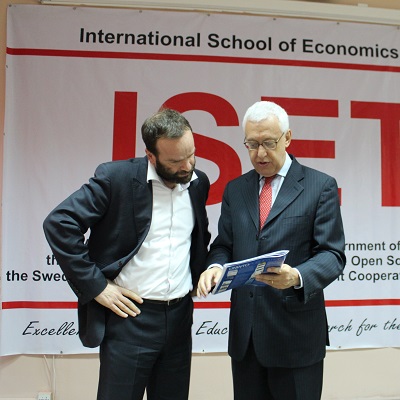On Wednesday, January 27th ISET hosted Mr. Marcio Favilla Lucca de Paula, Executive Director for Operational Programmes and Institutional Relations at the World Tourism Organization (UNWTO) based in Madrid, Spain. World Tourism Organization became one of the UN specialized agencies in 2013 and is the newest one among 14 specialized agencies. The organization has more than 150 member states along with affiliate members encompassing private organizations and universities.
Dr. de Paula delivered a speech on global tourism trends and perspectives. He started his presentation with global tourism statistics showing impressive increase in the number of international tourists travelling around the world from 25 mln tourist arrivals in 1950 to 1 bln in 2012. He also discussed the definition of the term “tourist” and the difference between 1 day visitors and visitors who stay in the country at least for 1 night but less than for 365 days. Latter are defined as tourists. He also pointed out the importance of residence instead of nationality when accounting for international tourists.
Dr. de Paula spoke about the difficulties in measuring domestic tourism and discussed surveys conducted to estimate these flows. According to UNWTO’s latest estimates, number of domestic tourists is about 6 bln which includes 3 bln for China only and more than 1.2 bln for India only. Given such high figures for these countries, estimate of 6 bln is rather conservative.
Presenter also discussed the role of tourism which corresponds to almost 10% of global GDP and is a source of employment for many people all over the world. According to the statistics, 1 out of 11 jobs are generated through tourism. Tourism is an important part of international trade and constitutes about 30% of international trade in services and 6% of global trade in goods and services. Dr. de Paula brought an example of Spain where 60% of energy imports are financed through surplus generated from tourism. The role of tourism was emphasized by UN when last year so called “Sustainable Development Goals” were approved. Out of 17 goals 3 explicitly mention tourism proving increasing importance of the sector for the economic growth.
In conclusion Dr. de Paula discussed distribution of international tourists between developed and emerging economies as well as challenges of safety and security.











